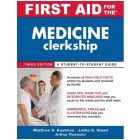Internal Medicine Clerkship
Starting the journey to internal medicine Internal Medicine is one of the major departments in the medical profession. The students are involved in the care of patients in internal medicine not just because it is a requirement, but because it is where the common and varied disease entity belongs. The clerkship program is meant to supplement and enhance the clinical skills and critical thinking of the students. It serves as a foundation in preparation for future doctors who would like to be a part of the department. Most clerkship in internal medicine would take eight weeks duration.
The core of medical clerkship
Clerkship is a form of training which is designed to enhance the student in the following areas:
- Clinical skills specific for internal medicine
- Analyze patient problems
- Develop the holistic approach for patient care
- Organized and proper communication to the patient and other members of the health care team
- Clinical assessment including patient interview and examinations
- Understand the physiology involved in the patient’s condition
- Understand the indication for diagnostic tool and interpretation of the results
- Formulate treatment plan and management
- Management evaluation and discharge instructions
Guide for patient care
The students are assigned to care for specific patients and are expected to know the basic approach of assessment, diagnosis, and evaluation. Clerkship is the time where students develop the proficiency in history taking and physical examination. With guidance, the student will also learn on how to correctly interpret laboratory results and to be able to correlate it with the patient’s condition.
Focus of Internal Medicine
During the eight week rotation in the department, the students will encounter common disease but is not limited to the following:
- Pulmonology: Pneumonia, Pulmonary Embolism
- Endocrinology: Diabetes
- Cardiovascular:
- Neurology: Meningitis, Delirium, Altered mental status, Headache
- Gastrointestinal: GI Bleeding, Ascites, Abdominal Pain, Metabolic disturbances
- Hematology & Infectious: Anemia, HIV
- Renal: Acute Kidney Injury
- Musculoskeletal: Back Pain
What to expect
- Line of Profession: Clerks will be assigned to a team to work with, and each team will have a specific schedule to follow. A resident will be assigned to monitor and evaluate the students when they enter the clerkship program. It is also the role of the residents, as well as fellows to teach and help the students solve problems. Students are encouraged to ask question when they are unsure of certain procedure or tasks. Communication is very important within the health care team to maintain quality health care.
- Daily Schedule: Students are considered to be a part of the medical internship once they enter the clerkship program. As a part of the medical team, the student should attend morning conferences, general rounds, patient rounds, case discussions and other general assembly of the department. When the work for the day is done, the student is expected to properly endorse the patient’s case and particular care needed.
- Clerkship Requirements: Assignments will be given and checked by the residents assigned to the student. Students are also required to complete patient documents and write-ups. Reporting, quizzes, examinations, or a case analysis could be given to evaluate the student’s knowledge at the end of clerkship in the department of internal medicine.
- Other basis for evaluation: Knowledge is not the only element being measured during clerkship. Attendance and punctuality is also considered as well as the student’s attitude and professionalism.


